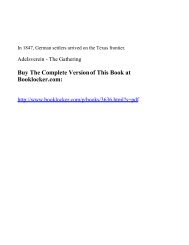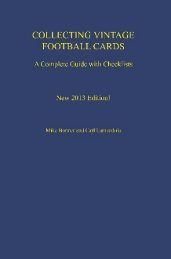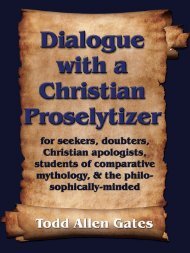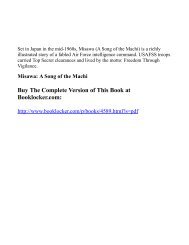AMERICAN GLADIATOR: The Life And Times Of ... - The Book Locker
AMERICAN GLADIATOR: The Life And Times Of ... - The Book Locker
AMERICAN GLADIATOR: The Life And Times Of ... - The Book Locker
Create successful ePaper yourself
Turn your PDF publications into a flip-book with our unique Google optimized e-Paper software.
<strong>AMERICAN</strong> <strong>GLADIATOR</strong><br />
Many contend that Louisville and New York City share the honor. That is, they are co-founders, that opinion<br />
based on the solid, historical precept that the National League founding could not have been done without both of<br />
them. This is absolutely true, considering the logistics of the situation: four “western” and four “eastern” teams.<br />
However, there is a third belief about the National League’s founding, which is perhaps the most radical of<br />
all. That is the contention that Louisville was the outright founder of the National League.<br />
A notable advocate of that viewpoint is the renowned baseball writer and historian, Harold Seymour, who<br />
boldly stated in his classic work, Baseball: <strong>The</strong> Early Years: “At Louisville, Hulbert and (St. Louis owner Charles)<br />
Fowle were appointed a committee with full power to act for the Western clubs and given the job of going east to<br />
negotiate with the Eastern teams they wanted to include. Louisville, therefore, was the real birthplace of the<br />
National league, not New York City.”<br />
This is not an isolated quote. Part of a baseball item from the Sunday, March 27, 1892 issue of the Louisville<br />
Courier-Journal says: “It is not well known that the first meeting of the National League was held in this city, at<br />
the Louisville Hotel.” (<strong>The</strong> correct site is discussed later in this chapter.)<br />
Today, the various supporters are still divided into three distinct camps, two of which have credibility. Nononsense<br />
hard-liners like Seymour, acknowledged by many as the game’s greatest scholar and the namesake of<br />
one of this country’s finest baseball research awards, say that Louisville founded the National League.<br />
Compromise artists say that Louisville, along with New York, co-founded the National League, the most<br />
reasonable assessment when all the factors are weighed in.<br />
<strong>The</strong> third group, which adheres to the line that New York City founded the National League, is occupied<br />
solely by criminal historical plunderers and dysfunctional revisionists.<br />
******<br />
Louisville began its major-league play by losing its opener at home on Tuesday, April 25, 1876 before some<br />
6,000 fans to the Chicago White Stockings, the National League’s inaugural flagwinner.<br />
<strong>The</strong> Chicago club was a powerhouse that included the league’s champion pitcher in Albert Spalding; the<br />
loop’s champion batter in Ross Barnes; and future Hall-of-Fame first-sacker Cap Anson, the first man to collect<br />
3,000 hits. After a brief hiatus, a revised Chicago club came back in the 1880s and became the game’s first<br />
dynasty. In the space of seven years, they churned out five flags behind the likes of Anson, George Gore, Billy<br />
Sunday, and eventual Hall-of-Famer King Kelly. <strong>The</strong> club also featured a first-flight infield. Nicknamed “<strong>The</strong><br />
Stone Wall” by foes who viewed it as virtually hit-proof, its second-sacker was Louisville native Fred Pfeffer.<br />
<strong>The</strong> opening-day score was 4-0, and was the first shutout in National League and thus, major-league history.<br />
<strong>The</strong> pitcher of record for the Louisville Grays was the brilliant Jimmy Devlin, a rising gold-and-silver-laden star<br />
who destroyed himself the following season.<br />
<strong>The</strong> inaugural 1876 campaign ended the way it had begun—with a loss, Louisville dropping an 11-2 decision<br />
on Thursday, October 5, 1876 at home to the Hartford Dark Blues behind James Clinton.<br />
Favored to win the 1877 National League pennant, the Louisville franchise suffered a late-season tailspin,<br />
that initially attributed to poor hitting and star pitcher Jimmy Devlin’s bout with a case of the boils.<br />
Instead, they ran a disappointing second to the Boston Red Caps. After the season, the reason became clear: a<br />
mammoth game-fixing scandal that ultimately led to Louisville’s ignominious departure from the National League<br />
and the lifetime expulsion of five Louisville players: utility infielder Al Nichols, outfielder George Bechtel,<br />
shortstop Bill Craver, outfielder George Hall and pitcher Jimmy Devlin. It was a particularly cruel blow to a city<br />
who was both a charter member and co-founder of the league.<br />
<strong>The</strong> scandal’s damage also reached quarters far beyond the team. One prime example was Walter N.<br />
Haldeman, one of the city’s most prominent citizens. Publisher of the renowned Louisville Courier-Journal and<br />
President of the National League Louisville Baseball Club, he had been encouraged by his son, John Avery<br />
Haldeman, to give more space in the newspaper to baseball.<br />
This was far from partisanship. Buoyed by the additions of such players as Hall, first-baseman Juice Latham,<br />
center fielder Bill Crowley and right fielder Orator Shaffer, the 1877 Louisville Grays sported a new look that<br />
made it a major contender for the flag in the eyes of many.<br />
20
















